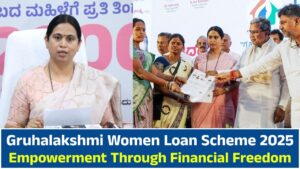Gruhalakshmi Women Loan Scheme 2025
1. Introduction: Women Empowerment Through Financial Freedom
The Karnataka government has taken a significant step toward empowering women by launching the Gruhalakshmi Women Loan Scheme 2025, aimed at enabling economic independence for rural and urban women. This scheme offers collateral-free loans ranging from ₹3 lakh to ₹5 lakh, helping women start or expand their own businesses and become financially self-reliant.

It is an extension of the Gruhalakshmi DBT scheme, where eligible women receive ₹2,000 per month. This loan scheme is part of a larger mission aligned with the 50-year celebration of the Women and Child Development Department and Anganwadi Centres, promoting the broader agenda of self-employment and women entrepreneurship in Karnataka.
2. Scheme Objectives
- Encourage financial independence among women.
- Enable self-employment and entrepreneurship.
- Provide easy access to credit without collateral.
- Support small-scale industries, agriculture, and local businesses.
- Strengthen women-led Self-Help Groups (SHGs) in villages and towns.
3. Key Features of the Loan
- Loan Amount: Between ₹3,00,000 and ₹5,00,000.
- Collateral: Not required.
- Interest Rate: Low, subsidized by the government.
- Loan Disbursement: Through cooperative banks like NABARD, Karnataka Gramin Vikas Bank, Apex Bank.
- Loan Purpose: Agriculture, micro-enterprises, food processing, and other livelihood activities.
4. Who is Eligible?
To qualify for this scheme:
- Must be a registered Gruhalakshmi beneficiary receiving ₹2,000 monthly.
- Should be a member of a Gruhalakshmi SHG, with 4 to 10 women.
- Women between 18 and 60 years can apply.
- SHG must have a joint bank account where the ₹2,000 monthly assistance is deposited.
- Must actively save for six months before becoming eligible to apply.
5. Self-Help Group (SHG) Formation and Operation
- A minimum of 4 and a maximum of 10 women must come together to form a group.
- The group must open a joint bank account in a nearby cooperative or rural bank.
- Each woman will deposit her ₹2,000 monthly support into the SHG account.
- After six months, the SHG can apply for a group loan of up to ₹5 lakh.
This group savings model enhances discipline, financial planning, and accountability.
6. Loan Usage Areas
The scheme promotes diverse sectors where women can invest the loan amount:
🔸 Agriculture:
- Buy tractors, tillers, seeders, irrigation tools.
- Use for organic farming and allied activities.
🔸 Small Businesses:
- Grocery and provision stores.
- Fruit and vegetable stalls.
- Tailoring shops, beauty parlors, etc.
🔸 Food Processing:
- Papad, pickles, snacks, biscuits, jam, and jelly production.
🔸 Handicrafts & Home-based Work:
- Stitching, embroidery, knitting, jewelry making.
🔸 Service-based Enterprises:
- Tiffin services, home tuition, day-care centers, recharge outlets.
7. Application Process: Step-by-Step Guide
🔹 Offline:
- Visit your nearest Women & Child Development Office.
- Take help from Anganwadi workers or Panchayat development officers.
- Submit documents and SHG details.
🔹 Online:
- Apply via the Seva Sindhu portal or official WCD Karnataka website.
- Provide Aadhar, Gruhalakshmi ID, SHG bank passbook, and business plan.
📞 Helpline:
- A toll-free state helpline number will assist applicants.
8. Sample Calculation (Example Case)
A 10-woman SHG deposits ₹2,000 per member monthly = ₹20,000/month
Yearly savings: ₹2.4 lakh
Loan eligibility after 6 months: ₹5 lakh
Use loan for a dairy and fruit stall; repay in 2–3 years while earning ₹15,000+ per month individually.
9. Benefits to Women
- No need for a guarantor or asset mortgage.
- Subsidized interest ensures affordable repayment.
- Encourages financial responsibility and teamwork through SHG model.
- Enables rural and urban women to equally access funds.
- Empowers women to become independent entrepreneurs and leaders.
10. Scheme Timeline & Rollout
- Pilot phase starts in October 2025 in select districts.
- Gradual expansion to all districts in Karnataka by 2026.
- Administered by the Department of Women and Child Development.
11. Government Linkages
- Linked with Suvarna Mahotsav celebrations of the WCD Department.
- Encouraged through Anganwadi networks and Bapuji Seva Kendras.
- Will eventually integrate with PMEGP, Stand-Up India, and Skill India schemes.
12. Risks & Challenges
Challenges:
- Lack of awareness in remote villages.
- Digital illiteracy for online application.
- Mismanagement or misuse of loan funds.
- Delayed loan sanction or group disputes.
Mitigation:
- Statewide awareness and training drives.
- Financial literacy sessions through Anganwadis.
- Transparent auditing and regular follow-ups.
13. Monitoring, Support & Training
- Loans monitored by district-level WCD officers.
- Regular audits of SHGs and bank transactions.
- Training via RSETI (Rural Self Employment Training Institutes).
- Support in project planning, budgeting, and marketing.
14. Expected Impact
- Financial independence for over 1 crore women in Karnataka.
- Creation of over 10 lakh women-led enterprises by 2026.
- Strengthens local rural economy and supply chains.
- Reduces dependency on private financiers and moneylenders.
- Builds confidence, leadership, and economic agency among women.
15. Required Documents
- Aadhar card
- Gruhalakshmi beneficiary ID
- SHG registration proof
- Joint bank account passbook
- Business use plan
- Photos and age proof
16. Contact Information
- 📞 Helpline: [To be officially announced]
- 🌐 Website: WCD Karnataka Official Portal or Seva Sindhu
- 🏢 Offices: Local Women and Child Development Offices, Taluk Panchayat, Bapuji Kendras
17. Conclusion: A Step Toward Economic Equality
The Gruhalakshmi Women Loan Scheme 2025 is a transformational policy for Karnataka, enabling lakhs of women to rise out of financial dependency and take control of their livelihood. Through self-help groups, structured savings, and access to subsidized credit, the scheme builds confidence, dignity, and prosperity.
It is more than just a loan program—it is a movement toward self-reliance and dignity for women. Every eligible woman in Karnataka is encouraged to form SHGs and participate actively in this opportunity to transform their future and support their families.
